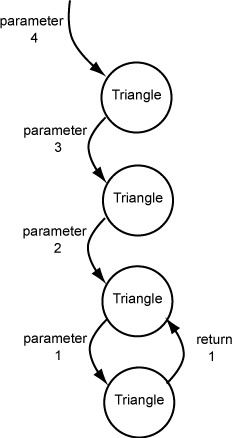Base Case

Finally we are at the base case.
When Triangle()if statement causes the
value 1 to be immediately returned.
The chain of activations is called an activation chain. The picture on this page shows the activation chain when it has reached the base case.
int Triangle( int N )
{
if ( N == 1 )
return 1;
else
return N + Triangle( N-1 );
}
Now look again at the activation where N = 2Triangle(1):
2 | int Triangle( int N ) { if ( N == 1 ) return 1; else return N + Triangle( N-1 ); | ------+------- | | 2 1 }